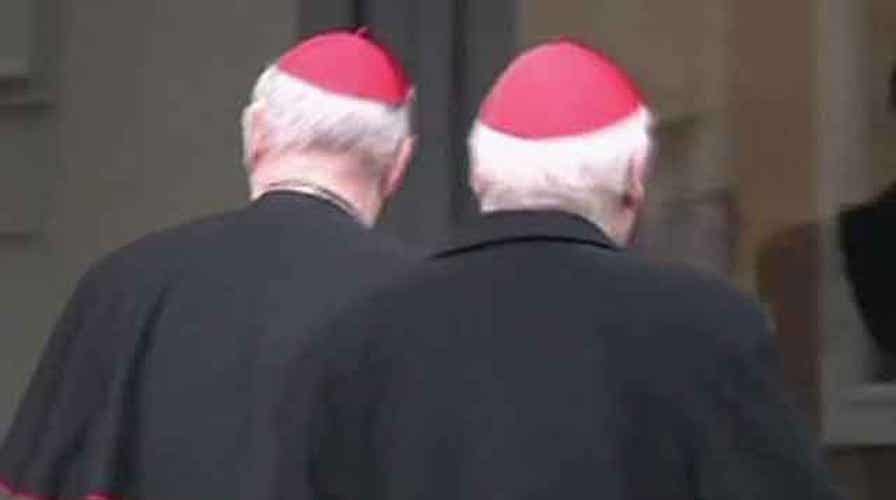VATICAN CITY – Cardinals gathered for their final day of talks Monday before the conclave to elect the next pope, amid debate over whether the Catholic Church needs more of a manager pope to clean up the Vatican or a pastoral pope who can inspire the faithful at a time of crisis.
There were indications that plenty of questions remained about the state of the church and the best man to lead it heading into Tuesday's conclave: Not all the cardinals who wanted to speak were able to Monday and the cardinals were forced to take a vote about continuing the discussion into the afternoon.
In the end, a majority of cardinals chose to cut short the formal discussion, and the cardinals who did speak shortened their comments, according to the Vatican spokesman the Rev. Federico Lombardi.
One of the main presentations came from Cardinal Tarcisio Bertone, the Vatican No. 2 who heads the commission of cardinals overseeing the scandal-marred Vatican bank. He outlined the bank's activities and the Holy See's efforts to clean up its reputation in international financial circles, Lombardi said.
The Holy See's finances, and particularly the work of the Vatican bank have been under the spotlight during these pre-conclave meetings as cardinals seek to investigate allegations of corruption in the Vatican administration and get to the bottom of the bank's long history of scandal and secrecy.
Cardinal Thomas Collins of Toronto, Canada, acknowledged the importance of the task at hand, telling reporters as he arrived Monday: "Yes, tomorrow is a very important day in the history of the church."
There's no clear front-runner for a job most cardinals say they would never want, but a handful of names are circulating as top candidates to lead the 1.2 billion-strong church at a critical time in its history.
Cardinal Angelo Scola has serious management credentials, running the archdiocese of Milan -- Italy's largest and most important -- and before that Venice, both of which have produced several popes in the past.
He's affable and Italian, but not from the Italian-centric Vatican bureaucracy. That makes him attractive perhaps to those seeking reform of the nerve center of the Catholic Church, which was exposed as corrupt and full of petty turf battles by the leaks of papal documents last year.
Brazilian Cardinal Odilo Scherer seems to be favored by the Vatican Curia, or bureaucracy. Scherer has a solid handle on the Vatican's finances, sitting on the governing commission of the Vatican bank, the Institute for Religious Works, as well as the Holy See's main budget committee.
As a non-Italian, the archbishop of Sao Paolo would be expected to name an Italian insider as secretary of state -- the Vatican No. 2 who runs day-to-day affairs at the Holy See -- another plus for Vatican-based cardinals who would want one of their own running the shop.
The pastoral camp seems to be focusing on two Americans, Cardinals Timothy Dolan of New York and Sean O'Malley of Boston. Neither has Vatican experience, though Dolan served in the 1990s as rector of the Pontifical North American College, the U.S. seminary up the hill from the Vatican. He has admitted his Italian isn't strong -- perhaps a handicap for a job in which the lingua franca of day-to-day administration is Italian, and the pope's other role is bishop of Rome.
If the leading names fail to reach the 77 votes required for victory in the first few rounds of balloting, any number of surprise names could come to the fore as alternatives.
Those include Cardinal Luis Tagle, archbishop of Manila. He is young -- at age 55 the second-youngest cardinal voting -- and was only named a cardinal last November. While his management skills haven't been tested in Rome, Tagle -- with a Chinese-born mother -- is seen as the face of the church in Asia, where Catholicism is growing.
Whoever it is, the new pope will face a church in crisis: Benedict XVI spent his eight-year pontificate trying to revive Catholicism from the secular trends which have made it almost irrelevant in places like Europe, once a stronghold of Christianity. Clerical sex abuse scandals have soured many faithful on their church, and competition from rival evangelical churches in Latin America and Africa has drawn souls away.
Tuesday begins with the cardinals checking into the Vatican's Domus Sanctae Martae, a modern, industrial-feel hotel on the edge of the Vatican gardens. While the rooms are impersonal, they're a step up from the cramped conditions cardinals faced before the hotel was first put to use in 2005; in conclaves past, lines in the Apostolic Palace used to form for using bathrooms.
Tuesday morning, the dean of the College of Cardinals, Angelo Sodano, leads the celebration of the "Pro eligendo Pontificie" Mass -- the Mass for the election of a pope -- inside St. Peter's Basilica, joined by the 115 cardinals who will vote.
They break for lunch at the hotel, and return for the 4:30 p.m. procession into the Sistine Chapel, chanting the Litany of Saints, the hypnotic Gregorian chant imploring the intercession of the saints to help guide the voting. They then take their oath of secrecy, listen to a meditation by elderly Maltese Cardinal Prosper Grech, and cast the first ballots.
The first puffs of smoke from the Sistine Chapel chimney should emerge sometime around 6:30 p.m. Black smoke from the burned ballot papers means no pope. White smoke means the 266th pope has been chosen.

